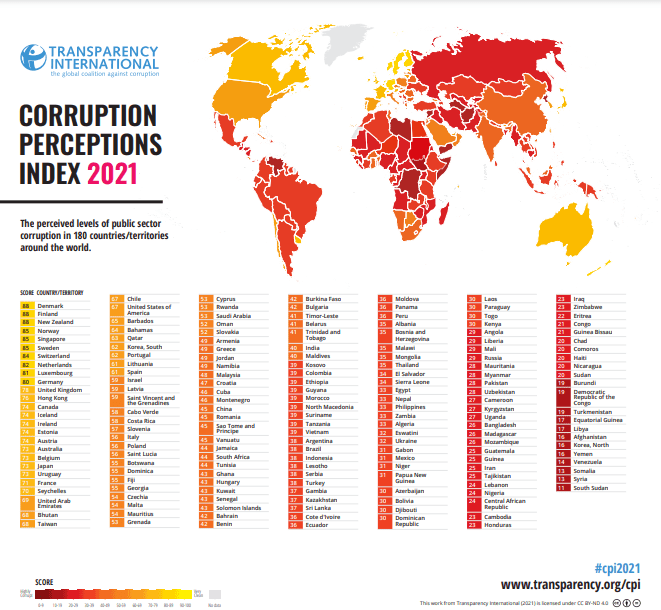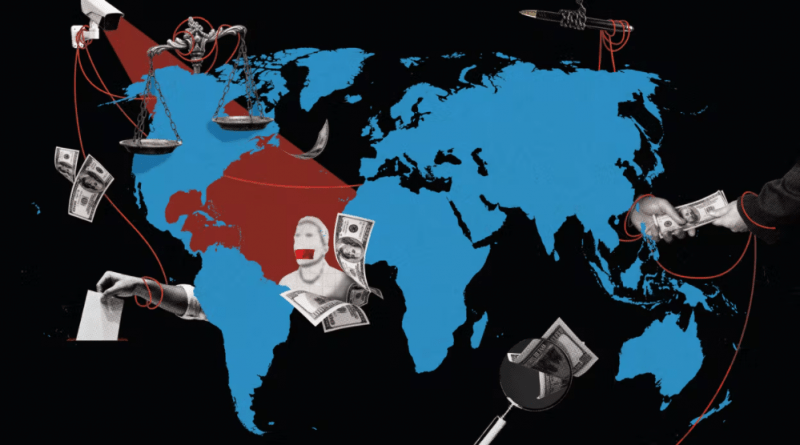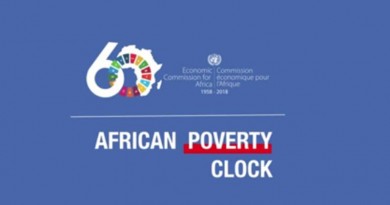Highlights and Insights on the 2021 Corruption Perception Index (CPI)
Two years into the devastating COVID-19 pandemic, this year’s Corruption Perceptions Index (CPI) reveals that corruption levels remain at a standstill worldwide.
Despite commitments on paper, 131 countries have made no significant progress against corruption over the last decade, and this year 27 countries are at a historic low in their CPI score. Meanwhile, human rights and democracy across the world are under assault.
This is no coincidence. Corruption enables human rights abuses. Conversely, ensuring basic rights and freedoms means there is less space for corruption to go unchallenged.
The 2021 CPI results show that countries with well-protected civil and political liberties generally control corruption better. The fundamental freedoms of association and expression are crucial in the fight for a world free of corruption.
There is an urgent need to accelerate the fight against corruption if we are to halt human rights abuses and democratic decline across the globe.
Corruption: How Does Your Country Fare? Check the map and table below

Highlights from the Index
The Index ranks 180 countries and territories by their perceived levels of public sector corruption according to experts and businesspeople. It relies on 13 independent data sources and uses a scale of zero to 100, where zero is highly corrupt and 100 is very clean.
More than two-thirds of countries (68 per cent) score below 50 and the average global score remains static at 43. Since 2012, 25 countries significantly improved their scores, but in the same period 23 countries significantly declined.
THE CPI USES A SCALE OF 0 TO 100
50/1002/3 of countries score below 5043/100The global average score
Top and bottom performers
This year, the top countries are Denmark, Finland and New Zealand, each with a score of 88. Norway (85), Singapore (85), Sweden (85), Switzerland (84), the Netherlands (82), Luxembourg (81) and Germany (80) complete the top 10.
South Sudan (11), Syria (13) and Somalia (13) remain at the bottom of the index.
Countries experiencing armed conflict or authoritarianism tend to earn the lowest scores, including Venezuela (14), Afghanistan (16), North Korea (16), Yemen (16), Equatorial Guinea (17), Libya (17) and Turkmenistan (19).

Check out the top movers and major setbacks or wins of the year for the Americas, Asia Pacific, Eastern Europe & Central Asia, Middle East & North Africa, Sub-Saharan Africa and Western Europe & the European Union.
What has changed?
Overall, the CPI shows that control of corruption has stagnated or worsened in 86 per cent of countries over the last decade.
CPI SCORE CHANGES, 2012-2021
In the last five years, several countries have fallen significantly down the Index, including Canada (-8), Nicaragua (-6), Honduras (-6) and Venezuela (-4). The most significant improvers over the same period are Armenia (+14), Angola (+10), South Korea (+8), Uzbekistan (+6), Moldova (+5) and Ethiopia (+4).
MOST SIGNIFICANT FIVE-YEAR MOVERS
Meanwhile, the scores of several democracies that used to top the Index and champion anti-corruption efforts around the world are deteriorating. Many of these high-scoring countries remain safe havens for corrupt individuals from abroad.
Find out which top-scoring countries are sliding down the CPI, while helping corrupt leaders in lower-scoring countries get away with corruption and human rights violations.CPI 2021: TROUBLE AT THE TOP
Rights under attack
From the repression of opposition supporters in Belarus, to the closing of media outlets and civil society organisations in Nicaragua, the deadly violence against protesters in Sudan and the killing of human rights defenders in the Philippines, human rights and democracy are under threat around the world.
Increasingly, rights and checks and balances are being undermined not only in countries with systemic corruption and weak institutions, but also among established democracies. Since 2012, 90 per cent of countries have stagnated or declined in their civil liberties score on the Democracy Index.
The global COVID-19 pandemic has also been used in many countries as an excuse to curtail basic freedoms and side-step important checks and balances.
And despite the increasing international momentum to end the abuse of anonymous shell companies, many high-scoring countries with relatively “clean” public sectors continue to enable transnational corruption.
The link between corruption and human rights
Our analysis of this year’s CPI results shows that upholding human rights is crucial in the fight against corruption, with countries who violate civil liberties generally scoring lower on the CPI.
Corruption undermines the ability of governments to guarantee the human rights of their citizens. This affects the delivery of public services, the dispensation of justice and the provision of safety for all. In particular, grand corruption committed by high-level officials usually combines the large-scale, transnational theft of public funds with gross human rights violations.
Our analysis shows that such corruption schemes – often facilitated by advanced economies who score well on the CPI – exacerbate repression by allowing autocrats to:
- Enjoy looted funds. Employing complicit bankers, lawyers and real-estate brokers in major financial centres, the corrupt can store their illicit gains, reward cronies and further concentrate their power.
- Launder their reputation abroad. By bribing foreign politicians and employing western public relations firms and lobbyists, authoritarian and kleptocratic regimes soften international pressure on their human rights record.
- Evade accountability. Through the abuse of secret companies and anonymous investments, the corrupt can hide their wrongdoing from law enforcement or judicial bodies and escape consequences.
Human rights are not simply a nice-to-have in the fight against corruption. Authoritarianism makes anti-corruption efforts dependent on the whims of an elite. Ensuring that civil society and the media can speak freely and hold power to account is the only sustainable route to a corruption-free society.
Delia Ferreira RubioChair, Transparency InternationalTweet this
Fundamental rights such as freedom of expression, freedom of assembly and access to justice guarantee public participation and keep corruption in check. The current wave of authoritarianism is not driven by coups and violence, but by gradual efforts to undermine democracy. This usually begins with attacks on civil and political rights, efforts to undermine the autonomy of oversight and election bodies, and control of the media.
Such attacks allow corrupt regimes to evade accountability and criticism, allowing corruption to flourish.
CORRUPTION AND BREACHES OF CIVIL LIBERTIES
Source: Economist Intelligence Unit, Democracy Index 2020.
Armenia
Armenia is a success story of the CPI in the last five years, improving 14 points since 2017 to a score of 49. Mass protests in 2018 forced out an entrenched political elite in favour of a reform-minded government. Armenia has since expanded civil liberties, paving the way for more sustainable civic engagement and accountability. Despite progress, the reform agenda has stalled in the past year and the government must recommit.
Uzbekistan
Uzbekistan is one of the most consistent improvers in the CPI, from a score of just 17 in 2012 to 28 this year. Reforms adopted since 2016 contributed to modest increases in civil liberties, particularly freedom of expression. However, Uzbekistan remains an autocracy and much more is needed to achieve lasting wins against corruption.
Singapore
A modernised economy, efficient bureaucracy and strong rule of law all contribute to Singapore’s success. However, it continues to fall far behind on human rights such as freedom of expression and association, which means that any anti-corruption success is tied to the political will of the ruling elite and can be easily reversed.
An unsafe climate for speaking out
Corruption and impunity make it unsafe for people to speak up and demand justice. Ninety-eight per cent of the 331 murders of human rights defenders in 2020 occurred in countries with high levels of public sector corruption, as shown by a CPI score of below 45. At least 20 of these cases were human rights defenders specifically focusing on anti-corruption issues.
CORRUPTION AND MURDERS OF HUMAN RIGHTS DEFENDERS
Source: Frontline Defenders, Global Analysis 2020.
Nicaragua
Nicaragua has dropped 9 points in the index since 2012, to a low of just 20. The long-serving president, Daniel Ortega, has responded to corruption allegations with a crackdown on media, civic space and oversight institutions. Nicaragua’s scores on on V-Dem’s “Freedom of Expression”, “Freedom of Association” and “Access to Justice” indicators have now dropped to record lows.
Philippines
With a score of 33, the Philippines is a significant decliner, having lost 5 points since 2014. Since the election of Rodrigo Duterte, the Philippines has also seen a sharp decline in freedom of association and freedom of expression, making it harder to speak up about corruption. In 2020, it was the country with the second highest number of murdered human rights defenders, with a total of 25 deaths.
Azerbaijan
Azerbaijan has remained in the bottom third of the CPI since 2012, its score oscillating between 25 and 30. In 2017, the Azerbaijani Laundromat investigation revealed how a vast slush fund financed the regime’s reputation laundering by making payments – mostly through Danske Bank – to politicians across Europe, while jailing outspoken opposition and media figures at home.
What needs to be done
Corruption may be a multifaceted problem, but it is one we know how to solve. We are calling on the public to demand that governments act on their own anti-corruption and human rights commitments, some of which are decades old and remain unfulfilled. Many of the anti-corruption successes in recent history have been due to the tireless, coordinated efforts of ordinary people, who have taken great personal risks to make change happen.
To end the vicious cycle of corruption, human rights violations and democratic decline, people should demand that their governments:
- Uphold the rights needed to hold power to account. Governments should roll back any disproportionate restrictions on freedoms of expression, association and assembly introduced since the onset of the pandemic. Ensuring justice for crimes against human rights defenders must also be an urgent priority.
- Restore and strengthen institutional checks on power. Public oversight bodies such as anti-corruption agencies and supreme audit institutions need to be independent, well-resourced and empowered to detect and sanction wrongdoing. Parliaments and the courts should also be vigilant in preventing executive overreach.
- Combat transnational forms of corruption. Governments in advanced economies need to fix the systemic weaknesses that allow cross-border corruption to go undetected or unsanctioned. They must close legal loopholes, regulate professional enablers of financial crime, and ensure that the corrupt and their accomplices cannot escape justice.
- Uphold the right to information in government spending. As part of their COVID-19 recovery efforts, governments must make good on their pledge contained in the June 2021 UNGASS political declaration to include anti-corruption safeguards in public procurement. Maximum transparency in public spending protects lives and livelihoods.




